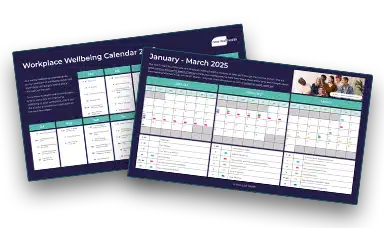If you’re a workplace wellbeing leader, you’ve almost certainly heard about Mental Health First Aid (MHFA). You might even have a team of qualified Mental Health First Aiders in your organisation. But the reality is that many UK businesses either don’t have Mental Health First Aid in the workplace, or if they do, the role isn’t properly understood or supported.
So we’ve put together a comprehensive guide outlining exactly what Mental Health First Aid is, why it matters, how to implement it effectively, and, most importantly, how to ensure your Mental Health First Aiders are properly trained and supported to make a real difference in your workplace.
Table of Contents
What is Mental Health First Aid?
Mental Health First Aid (MHFA) is an internationally recognised training programme that teaches people how to identify, understand, and respond to signs of mental health issues in the workplace. Just as physical first aiders provide immediate support for physical injuries, Mental Health First Aiders offer initial assistance to colleagues experiencing mental health challenges.
It’s important to note that Mental Health First Aid doesn’t replace professional mental health services. Instead, it acts as a crucial bridge between someone experiencing difficulties and the professional help they may need. Mental Health First Aiders are trained to provide immediate support, have conversations about mental health, and signpost colleagues to appropriate resources.
What is a Mental Health First Aider?
A Mental Health First Aider (MHFAider) is an employee who has received accredited training to recognise the signs and symptoms of common mental health conditions, provide initial support, and guide individuals towards appropriate professional help. They perform this role in addition to their existing responsibilities, typically dedicating a few hours each week to it.
What is the Role of a Mental Health First Aider?
Mental Health First Aiders have a crucial but clearly defined role within your organisation. They are there to:
- Act as a point of contact for colleagues who are experiencing mental health issues or emotional distress
- Actively listen without judgment and provide reassurance and support
- Help colleagues access appropriate resources, information, and professional help
- Promote mental health awareness and help reduce stigma around mental health in the workplace
- Support colleagues through crises until professional help can be accessed
Importantly, Mental Health First Aiders are not therapists, counsellors, or mental health professionals. Their role is to provide initial support and signposting, not to diagnose conditions or provide ongoing therapy.
Key Characteristics Needed in a Mental Health First Aider
When recruiting Mental Health First Aiders, you’ll want to look for individuals who possess certain qualities. These include:
- Empathy – the ability to understand and share the feelings of others
- Trustworthiness – colleagues need to feel confident confiding in them
- Good listening skills – being able to listen actively without interrupting or judging
- Discretion – understanding the importance of confidentiality
- Resilience – the emotional strength to deal with challenging conversations
- Open-mindedness – being non-judgmental and accepting of different experiences
- Approachability – making people feel comfortable coming to them for support
- A genuine interest in wellbeing – a passion for supporting colleagues’ mental health
While this isn’t an exhaustive list, it’s certainly a great starting point when looking for prospective Mental Health First Aiders.
Why Does Mental Health First Aid Matter in the Workplace?
You might wonder why Mental Health First Aid has become so important in modern workplaces. After all, businesses have existed for centuries without Mental Health First Aiders. Well, times change, and just as some roles become obsolete, new roles like Mental Health First Aiders become essential.
The scale of the mental health challenge facing UK workplaces is enormous. Research shows that mental health conditions affect one in four people in the UK each year. In 2023/24, an average of 21.1 working days were lost per person due to stress, depression, or anxiety.
Empower your Teams with Critical Mental Health First Aid Skills
The Impact of Mental Health First Aid on Workplace Culture
Having Mental Health First Aiders helps to build a strong and supportive workplace culture. When properly trained and utilised, Mental Health First Aiders will help to promote a range of positive initiatives, including:
- Normalising conversations around mental health and wellbeing
- Reducing stigma around mental health conditions, making it easier for people to seek help
- Building a more inclusive workplace where everyone feels supported
- Creating early intervention opportunities that can prevent mental health crises
- Demonstrating that your organisation genuinely cares about employee wellbeing
Tangible Benefits of Mental Health First Aid in the Workplace
Importantly, you shouldn’t be measuring the success of your Mental Health First Aiders based on vibes and good feelings (though these are important) – the benefits should be measurable. With a successful MHFA programme, you could expect to see:
- Reduced absenteeism due to mental health issues
- Decreased presenteeism (people attending work but being less productive)
- Improved staff morale and engagement
- Increased retention rates
- Better utilisation of existing wellbeing resources like EAPs
- Faster access to professional help for those who need it
These are all measurable benefits that will directly contribute towards the success of your business.
The Business Case for Mental Health First Aid
When it comes to pitching a Mental Health First Aid programme to senior leadership, this is what everybody wants to know: what’s the return on investment? You read that in your finance director’s voice, didn’t you?
The numbers speak for themselves. According to recent research, mental health issues cost UK employers approximately £56 billion each year. This breaks down to:
- Presenteeism: approximately £28 billion
- Staff turnover: approximately £22 billion
- Absenteeism: approximately £6 billion
The Thriving at Work review, commissioned by the UK Government and published in 2017, found that poor mental health costs employers between £33 billion and £42 billion a year, with an annual cost to the UK economy of between £74 billion and £99 billion.
But here’s the positive news: for every £1 invested in mental health support for employees, research suggests employers can see a return of £5 in reduced absences and presenteeism. More recent figures from Deloitte (2024) suggest that for every £1 spent by employers on staff wellbeing, they get back £4.70 in reduced absence, presenteeism, and staff turnover.
Additionally, having Mental Health First Aiders can help you meet the recommended core standards for a healthy workplace as set out in the Government’s Thriving at Work report, which we’ll explore more later.
Mental Health First Aid vs Mental Health Champions: What’s the Difference?
If you’ve read our guide on Workplace Wellbeing Champions, you might be wondering: what’s the difference between a Mental Health First Aider and a Wellbeing Champion?
It’s a great question, and while there’s some overlap, the roles are distinctly different:
Mental Health First Aiders
- Have specific, accredited training in recognising and responding to mental health crises
- Provide immediate, one-to-one support to individuals experiencing mental health issues
- Focus on reactive support and signposting to professional help
- Trained to handle crises and mental health emergencies
- Need to understand clinical signs and symptoms of mental health conditions
- Require clear boundaries and protocols for escalation
Workplace Wellbeing Champions
- Focus on proactively promoting health and wellbeing across all four pillars (physical, mental, social, and financial)
- Organise events, campaigns, and activities to promote wellbeing
- Help implement your broader wellbeing strategy
- Bridge the gap between staff and wellbeing resources
- Encourage open dialogue around all aspects of wellbeing
- Focus on prevention and health promotion
Think of it this way: Wellbeing Champions are like your health promotion team, focusing on keeping everyone well. Mental Health First Aiders are like your emergency response team, ready to step in when someone needs immediate support.
The good news? These roles complement each other beautifully. Many organisations have both Wellbeing Champions and Mental Health First Aiders working together as part of a comprehensive wellbeing strategy.
Build a team of Champions to help put your wellbeing strategy into action
How to Implement Mental Health First Aid in Your Workplace
Implementing a Mental Health First Aid programme isn’t something you should rush into. Like any workplace initiative, it needs careful planning, proper training, and ongoing support. Let’s break it down into manageable steps.
Step 1 – Conduct a Needs Assessment
Before you start recruiting Mental Health First Aiders, you need to understand your organisation’s specific mental health needs. This involves:
- Reviewing absence data related to mental health
- Conducting staff surveys or focus groups to understand mental health concerns
- Assessing your current mental health support provision
- Identifying any gaps in your existing wellbeing strategy
- Understanding the specific challenges faced by different departments or locations
This baseline assessment will help you make informed decisions about how many Mental Health First Aiders you need and where they should be positioned within the organisation.
Step 2 – Secure Leadership Buy-In
As with most business initiatives, securing leadership buy-in can be one of the biggest obstacles to overcome. Most of the time, this will come down to cold, hard numbers (and usually with a pound sign in front of them).
When presenting your business case, include:
- The cost of mental health issues to your organisation (using your own absence data if possible)
- The potential return on investment (£5 returned for every £1 spent)
- How MHFA aligns with your legal duty of care as an employer
- How it supports the core standards recommended in the Thriving at Work review
- Case studies from similar organisations that have successfully implemented MHFA
Also, consider putting it in real terms. For example, if stress is a significant cause of absence rates within your business, you could highlight how having trained Mental Health First Aiders could help colleagues access support earlier, potentially preventing long-term absence.
Step 3 – Choose the Right Training Provider
This is crucial. Mental Health First Aid training must be delivered by an accredited provider to ensure it meets quality standards. In England, MHFA England is the only provider of licensed Mental Health First Aid Instructor Training, accredited by the Royal Society for Public Health.
Look for training that:
- Is accredited by a recognised body
- Covers both theoretical knowledge and practical skills
- Includes ongoing support and resources
- Offers refresher training opportunities
- Aligns with current best practice and research
Here at New Leaf Health, we’ve been training Mental Health First Aiders around the UK for almost 10 years, and we offer accredited courses that give your team the skills and confidence they need to support colleagues effectively.
Empower your Teams with Critical Mental Health First Aid Skills
Step 4 – Recruit Your Mental Health First Aiders
When recruiting Mental Health First Aiders, it’s important to be clear about expectations and intentional about who you recruit – in other words, don’t just say yes to fill up the numbers.
Clarity of the role is crucial. Your recruitment communications should clearly outline:
- What the role involves (and what it doesn’t)
- Time commitment required (typically 1-2 hours per week)
- The training they’ll receive
- How they’ll be supported in the role
- That the role is voluntary and in addition to their existing job
Invite volunteers rather than appointing people. Mental Health First Aiders need to genuinely want to do this role. It can be emotionally demanding, and people need to choose to take it on.
Ensure diversity and representation. Your Mental Health First Aiders should reflect the full diversity of your workforce. This includes representation across:
- Different departments and teams
- Various levels of seniority
- Different locations or sites
- Age groups, genders, ethnicities, and backgrounds
- Different lived experiences
When you have representatives from a variety of different backgrounds, this helps to develop acceptance and trust in your MHFA programme.
Step 5 – Provide Comprehensive Training
We’ll cover what training should include in detail in the next section, but it’s worth stressing here: providing formal, accredited training to your Mental Health First Aiders is not only essential to the success of your programme, but will pay dividends in the long run.
Mental Health First Aiders who receive quality training will be more confident, more effective, and less likely to experience burnout – meaning you’re less likely to need to keep recruiting new people to the role.
Step 6 – Launch Your Programme
It can be tempting to announce your newly trained Mental Health First Aiders and immediately start directing people to them. But this approach is likely to come with several teething problems.
Instead, launch in a phased approach:
- Soft launch – Start by letting teams know who their Mental Health First Aiders are and how to contact them
- Create awareness materials – Develop posters, intranet pages, and email signatures that promote the service
- Integrate with existing resources – Ensure Mental Health First Aiders know how to signpost to your EAP, occupational health, and other services
- Set up support structures – Establish regular supervision sessions and peer support networks for your Mental Health First Aiders
- Monitor and adjust – Have regular check-ins to see what’s working and what needs refining
Step 7 – Create Ongoing Support Structures
Mental Health First Aiders cannot operate in isolation. They need robust support structures, including:
- Regular supervision – Monthly one-to-ones to discuss cases (anonymously), challenges, and wellbeing
- Peer support – Opportunities to connect with other Mental Health First Aiders in the organisation
- Clear escalation pathways – Knowing exactly what to do when situations are beyond their scope
- Access to resources – Up-to-date information about internal and external support services
- Their own wellbeing support – Mental Health First Aiders need someone to turn to when they’re struggling
We’ll explore this in more detail later in the guide.

What Should Mental Health First Aid Training Include?
The content of Mental Health First Aid training is standardised across accredited courses, but it’s worth understanding what your Mental Health First Aiders will learn. Here’s what comprehensive MHFA training should cover:
Understanding Mental Health
Training should provide a thorough understanding of what mental health is and the factors that can affect it. This includes:
- The difference between mental health and mental illness
- The continuum of mental health (from thriving to crisis)
- How mental health can fluctuate over time
- The stigma surrounding mental health and how to challenge it
Common Mental Health Conditions
Mental Health First Aiders need to understand the signs and symptoms of common mental health conditions, including:
- Depression
- Anxiety disorders
- Psychosis
- Eating disorders
- Self-harm and suicidal thoughts
- Substance misuse issues
They should learn to recognise early warning signs and understand how these conditions can present in the workplace.
The Mental Health First Aid Action Plan
A core component of MHFA training is learning a structured approach to providing support. This typically follows an action plan framework:
- Approach, assess, and assist – How to start a conversation about mental health
- Listen non-judgmentally – Active listening skills and creating a safe space
- Give support and information – Providing reassurance and practical help
- Encourage professional help – Knowing when and how to signpost
- Encourage self-help strategies – Supporting individuals to help themselves
Communication Skills
Effective communication is vital for Mental Health First Aiders. Training should cover:
- Active listening techniques
- How to ask open questions
- Non-verbal communication
- Showing empathy without taking on others’ problems
- Having difficult conversations
- De-escalation techniques
Crisis Situations
Mental Health First Aiders need to be prepared to respond to crises, including:
- Recognising when someone is in crisis
- How to respond to someone experiencing suicidal thoughts
- Supporting someone who is self-harming
- Dealing with panic attacks
- When and how to get emergency help
- Keeping themselves safe in challenging situations
Boundaries and Self-Care
One of the most important aspects of MHFA training is understanding boundaries and protecting your own wellbeing. This includes:
- Recognising the limits of the Mental Health First Aider role
- Understanding when to escalate to professional help
- Maintaining confidentiality while ensuring safety
- Recognising signs of vicarious trauma or burnout
- Self-care strategies for Mental Health First Aiders
- Knowing when to seek support for yourself
Signposting and Resources
Mental Health First Aiders need comprehensive knowledge of:
- Internal support services (EAP, occupational health, HR policies)
- External support services (NHS, charities, helplines)
- How to make effective referrals
- Crisis support services (Samaritans, Crisis Team, 999/111)
- Online resources and apps
- Local mental health services
Legal and Ethical Considerations
Training should also cover:
- Employer duty of care responsibilities
- Equality Act 2010 and mental health
- Confidentiality and when to breach it
- Data protection considerations
- Safeguarding responsibilities
- How to document support provided (while maintaining privacy)
How Many Mental Health First Aiders Do You Need?
There’s no definitive answer to how many Mental Health First Aiders an organisation needs – there are a lot of factors at play. You’ll need to consider:
- Organisation size – Larger organisations naturally need more Mental Health First Aiders
- Number of locations – Each site should have coverage
- Shift patterns – If you operate 24/7, you’ll need Mental Health First Aiders across all shifts
- Department diversity – Different teams may have different risk factors and needs
- Remote and hybrid working – Consider how to support distributed teams
- Current mental health data – Higher absence rates may indicate a need for more support
General Guidelines
While every organisation is different, here are some general recommendations:
- The Thriving at Work review suggests treating mental health in a similar way to physical health, so aim to have as many Mental Health First Aiders as physical first aiders
- For smaller organisations (under 50 people), having 1-2 trained Mental Health First Aiders may be sufficient
- For medium organisations (50-500 people), consider a ratio of approximately 1 Mental Health First Aider per 20-30 employees
- For larger organisations (500+ people), you may need a ratio of 1 per 50-100 employees, depending on your needs assessment
However, these are just guidelines. Your needs assessment (Step 1) should give you a clearer picture of what’s right for your organisation.
Ensuring Adequate Coverage
When planning your numbers, make sure you have:
- Coverage across all locations and sites
- Representation across different departments
- Mental Health First Aiders across different shift patterns
- Enough people to account for holidays, sickness, and staff turnover
- A mix of seniority levels so people can choose who to approach
It’s also important to be realistic. If every Mental Health First Aider is spending 1-2 hours a week in their role, you need to ensure they’re not overstretched. The last thing you want is to create a situation where your Mental Health First Aiders are stressed and overwhelmed – the complete opposite of their purpose!
If you absolutely can’t decide how many you need, why not start with one Mental Health First Aider for every 20-30 people in your business, and adjust from there? If you’re following our advice (which you should be), then you’ll quickly find out during your phased launch if you need more.
Importantly, it’s always better to start with fewer and grow your team, rather than to start with too many Mental Health First Aiders and have an uncoordinated approach. Your strategy will be difficult to implement, and it will lose all of its impact.
Supporting Your Mental Health First Aiders
Mental Health First Aiders require robust and structured support to fulfil their roles effectively. Without proper support, they risk burnout, may provide inconsistent support, or could leave the role altogether.
Regular Supervision and Check-Ins
Monthly supervision sessions are essential. These provide Mental Health First Aiders with:
- A safe space to discuss cases (anonymously) and challenges they’ve faced
- An opportunity to seek guidance on difficult situations
- Emotional support for the impact of the role
- Reassurance that they’re doing things correctly
- A chance to raise any concerns about their own wellbeing
These sessions should be led by someone with appropriate mental health expertise – this could be an occupational health professional, a senior HR leader with mental health training, or an external supervisor.
One-to-one check-ins should also happen regularly, allowing Mental Health First Aiders to raise any concerns in private, especially if they relate to a sensitive issue like their own health and wellbeing.
Peer Support Networks
Creating opportunities for your Mental Health First Aiders to connect with each other is invaluable. This could take the form of:
- Quarterly peer support meetings where Mental Health First Aiders can share experiences
- A private online forum or chat group for quick questions and mutual support
- Pairing up Mental Health First Aiders as buddies
- Annual away days or training refreshers, where the whole team comes together
Clear Policies and Procedures
Your Mental Health First Aiders need to know exactly what’s expected of them and what to do in different situations. This means having:
- A clear role description outlining what Mental Health First Aiders do (and don’t do)
- Escalation procedures for when situations are beyond their scope
- Confidentiality guidelines explaining when information can and must be shared
- Record-keeping protocols that balance documentation with privacy
- Safeguarding policies so they know what to do if someone is at risk
- Time allocation agreements ensuring they have protected time for the role
Ongoing Training and Development
Mental Health First Aid training isn’t a one-and-done exercise. Mental Health First Aiders need:
- Refresher training – MHFA England recommends refreshing training every three years
- Additional training opportunities – Such as courses on specific conditions, trauma-informed practice, or neurodiversity
- Access to the latest research and guidance – Mental health best practice evolves
- CPD opportunities – To continue developing their skills
Resources and Tools
Make sure your Mental Health First Aiders have access to:
- Up-to-date resource directories – Information about internal and external support services
- Template documents – Such as safety plans or handouts for colleagues
- Promotional materials – Posters, email signatures, and intranet content promoting their role
- Communication channels – A dedicated email address or Teams channel for colleagues to reach them
- Private spaces – Access to confidential rooms for conversations
Recognition and Appreciation
Don’t underestimate the power of recognition. Mental Health First Aiders are volunteers doing additional work to support their colleagues. Show appreciation through:
- Regular recognition in team meetings or company communications
- Thank you messages or certificates
- Inclusion in wellbeing strategy reviews and planning
- Opportunities to present their work to senior leadership
- Small tokens of appreciation (though don’t make it feel transactional)
Protecting Their Wellbeing
Perhaps most importantly, you need to actively protect the wellbeing of your Mental Health First Aiders. This means:
- Monitoring their caseload – Ensuring they’re not overwhelmed
- Checking in on their mental health – They’re human too and may struggle
- Providing their own support – Access to EAP, occupational health, or external supervision
- Allowing them to step back – Creating a culture where they can say “I’m not in a good place to support right now”
- Preventing burnout – Ensuring workload is manageable and they have time off from the role
Remember, a burnt-out Mental Health First Aider is no help to anyone, least of all themselves.
Common Challenges and How to Overcome Them
Let’s be realistic: implementing a Mental Health First Aid programme won’t always be plain sailing. Here are some common challenges organisations face and how to address them.
Challenge 1: Mental Health First Aiders Stepping Beyond Their Role
This is one of the most common issues. Well-meaning Mental Health First Aiders can sometimes try to provide therapy, make diagnoses, or take on too much responsibility for a colleague’s wellbeing.
How to address it:
- Ensure training clearly defines the boundaries of the role
- Include boundary-setting as a regular topic in supervision
- Create clear escalation procedures
- Provide scripts and prompts for signposting to professional help
- Regularly remind Mental Health First Aiders: “Your job is to be a bridge, not a destination”
Challenge 2: Lack of Awareness Among Staff
You’ve trained your Mental Health First Aiders, but nobody’s actually using the service.
How to address it:
- Launch a comprehensive communications campaign
- Use multiple channels: posters, intranet, email, team meetings, newsletters
- Make it visible: include MHFA badges or lanyards, email signatures, team boards
- Have Mental Health First Aiders introduce themselves at team meetings
- Tie promotion to awareness days like World Mental Health Day
- Share success stories (anonymously) to demonstrate the value
Challenge 3: Confidentiality Concerns
Staff may worry that speaking to a Mental Health First Aider means their manager will find out about their mental health.
How to address it:
- Be transparent about confidentiality policies from the outset
- Explain the rare circumstances when confidentiality must be broken (risk of harm)
- Train Mental Health First Aiders to explain confidentiality at the start of conversations
- Have clear documentation about what information is recorded and who can access it
- Build trust through consistent practice
Challenge 4: Mental Health First Aiders Feeling Isolated
Mental Health First Aiders can feel alone in their role, especially in larger organisations or when working remotely.
How to address it:
- Set up regular peer support meetings
- Create online communities or chat groups
- Pair Mental Health First Aiders as buddies
- Ensure they have a clear point of contact for support
- Bring the team together regularly for training or social events
Challenge 5: Uneven Distribution of Work
Some Mental Health First Aiders may be inundated with requests, while others receive none.
How to address it:
- Monitor caseloads through supervision
- Ensure fair distribution across departments and shifts
- Investigate why some Mental Health First Aiders are approached more (accessibility? approachability?)
- Consider rotating a duty system if appropriate
- Address any issues with particular Mental Health First Aiders who aren’t being utilised
Challenge 6: Dealing with Complex or Crisis Situations
Mental Health First Aiders may encounter situations that feel beyond their capability.
How to address it:
- Provide thorough training on crises
- Create clear, simple escalation procedures
- Ensure 24/7 access to professional support (EAP, crisis services)
- Debrief after complex cases
- Normalise seeking help: “It’s a sign of good practice, not failure”
Challenge 7: Senior Leadership Not Taking It Seriously
Despite initial buy-in, senior leaders may not actively support the programme.
How to address it:
- Regularly report on MHFA activity and impact at the board level
- Invite senior leaders to meet Mental Health First Aiders
- Encourage senior leaders to complete MHFA training themselves
- Link MHFA outcomes to business priorities (retention, absence, productivity)
- Celebrate successes and share case studies
Challenge 8: Maintaining Momentum Over Time
Initial enthusiasm wanes, and the programme loses momentum.
How to address it:
- Make MHFA part of your permanent wellbeing strategy, not a project
- Refresh training every three years
- Regularly recruit new Mental Health First Aiders
- Continue promoting the service year-round
- Tie MHFA activity to awareness campaigns throughout the year
- Evaluate and improve the programme continuously
Measuring the Success of Your MHFA Programme
Evaluating the success of your Mental Health First Aid programme is crucial to demonstrating its value, securing continued investment, and identifying areas for improvement. As with any workplace initiative, you need a mix of qualitative and quantitative measures.
Baseline Assessment
Before launching your MHFA programme (or if you’ve already launched, as soon as possible), establish baseline metrics:
- Absence rates related to mental health
- Staff turnover rates
- Employee engagement scores
- Mental health-related grievances or concerns
- Utilisation of existing support services (EAP, occupational health)
- Staff survey results on mental health support and workplace culture
This gives you something to measure against as your programme develops.
Quantitative Metrics
Track specific numbers over time:
- Number of conversations – How many times Mental Health First Aiders have been approached
- Types of issues – What concerns are being raised (stress, anxiety, depression, etc.)
- Referrals made – How many colleagues have been signposted to professional help
- Absence rates – Changes in mental health-related sickness absence
- Retention rates – Whether staff retention improves
- EAP utilisation – Whether more staff are accessing existing services
- Staff survey scores – Improvements in perceptions of mental health support

Qualitative Feedback
Numbers only tell part of the story. Also gather:
- Feedback from colleagues who’ve used the service – Anonymous surveys about their experience
- Mental Health First Aider reflections – Their experiences, challenges, and suggestions
- Manager observations – Whether they’ve noticed positive changes in their teams
- Case studies – Anonymised examples of how MHFA has helped (with consent)
- Staff survey comments – Qualitative data about workplace mental health culture
Regular Review Cycles
Don’t wait until the end of the year to evaluate. Build in regular review points:
- Monthly – Review activity data and any immediate issues
- Quarterly – More in-depth analysis of trends and patterns
- Annually – Comprehensive evaluation with formal reporting to leadership
Questions to Ask
When evaluating your MHFA programme, consider:
- Are Mental Health First Aiders being utilised? If not, why not?
- What types of mental health issues are most common in your workplace?
- Are there any departments or teams with higher needs?
- Are colleagues being signposted to appropriate support?
- Have absence rates improved?
- Do staff surveys show increased awareness and reduced stigma?
- Are Mental Health First Aiders feeling supported and confident?
- What challenges have arisen, and how have they been addressed?
- What could be improved?
Demonstrating Return on Investment
To secure continued investment, you’ll need to show ROI. This could include:
- Calculating cost savings from reduced absence
- Showing improved retention rates and reduced recruitment costs
- Demonstrating increased productivity
- Highlighting early intervention to prevent escalation to crisis
- Showing increased utilisation of existing services (getting more value from your EAP)
Remember the statistic we mentioned earlier: for every £1 invested in staff wellbeing, employers see a return of £4.70 in reduced absence, presenteeism, and staff turnover. Use your own data to demonstrate this in your organisation.
Legal and Ethical Considerations
Implementing a Mental Health First Aid programme comes with important legal and ethical responsibilities. Let’s explore these in detail.
Employer Duty of Care
UK employers have a legal duty of care under the Health and Safety at Work Act 1974 to ensure the health, safety, and welfare of their employees. This explicitly includes mental health.
Employers must:
- Assess risks to mental health in the workplace
- Take reasonable steps to prevent harm to employees’ mental health
- Provide support for employees experiencing mental health issues
- Make reasonable adjustments for employees with mental health conditions
Having Mental Health First Aiders can help you meet this duty of care, but it shouldn’t be your only mental health provision.
The Equality Act 2010
Mental health conditions can be considered disabilities under the Equality Act 2010 if they have a substantial and long-term adverse effect on a person’s ability to carry out normal day-to-day activities.
This means employers must:
- Not discriminate against employees with mental health conditions
- Make reasonable adjustments to support employees with mental health conditions
- Consider disability discrimination claims if they fail to support employees appropriately
Mental Health First Aiders can help identify when adjustments might be needed and support the implementation of these adjustments.
Thriving at Work: Core Standards
The Thriving at Work review (2017) established six core standards that all UK employers should implement:
- Produce, implement, and communicate a mental health at work plan
- Develop mental health awareness amongst employees
- Encourage open conversations about mental health and the support available
- Provide employees with good working conditions
- Promote effective people management through line managers and supervisors
- Routinely monitor employee mental health and wellbeing
Having Mental Health First Aiders can help you meet standards 2 and 3, but they need to be part of a wider strategy addressing all six standards.
Confidentiality and Data Protection
Mental Health First Aiders will be privy to sensitive personal information. You need clear policies on:
- What information is recorded – Keep records minimal and necessary
- Where it’s stored – Secure, password-protected systems
- Who can access it – Very limited access on a need-to-know basis
- How long it’s kept – In line with GDPR principles
- When confidentiality can be broken – Only when there’s a risk of serious harm
Mental Health First Aiders must understand GDPR and confidentiality principles thoroughly.
Safeguarding and Duty to Report
There are circumstances when Mental Health First Aiders must break confidentiality:
- Risk of serious harm – If someone is at immediate risk of harming themselves or others
- Safeguarding concerns – If there are concerns about child protection or vulnerable adults
- Legal requirements – If required by law (e.g., terrorism concerns)
Your MHFA policies must clearly outline these circumstances and the procedures to follow.
Vicarious Trauma and Duty of Care to Mental Health First Aiders
Employers also have a duty of care to their Mental Health First Aiders. Repeated exposure to others’ trauma and distress can lead to vicarious trauma or compassion fatigue.
You must:
- Provide adequate training and ongoing support
- Monitor Mental Health First Aiders’ wellbeing
- Ensure reasonable caseloads
- Provide access to supervision and debriefing
- Allow Mental Health First Aiders to step back when needed
- Recognise signs of burnout and intervene early
Insurance and Liability
Check your employer’s liability insurance to see if it covers Mental Health First Aid activities. Most policies will cover this, but it’s worth confirming. Also, ensure that:
- Mental Health First Aiders are working within their trained scope
- Clear policies and procedures are in place
- Adequate supervision and support structures exist
- Training is accredited and up-to-date
Occupational Health Integration
Mental Health First Aid should complement, not replace, occupational health services. Ensure:
- Clear referral pathways to occupational health exist
- Occupational health professionals are aware of the MHFA programme
- There’s no confusion about roles and responsibilities
- Information is shared appropriately (with consent) when needed
Mental Health First Aid Training Courses
When you’re ready to train your Mental Health First Aiders, it’s important to choose the right course. Here’s what’s available:
MHFA England Courses
MHFA England is the only provider licensed to deliver Mental Health First Aid Instructor Training in England. Courses include:
Two-Day MHFA Course
- Comprehensive training covering all aspects of Mental Health First Aid
- Teaches the MHFA action plan and how to apply it
- Valid for three years before a refresher is needed
- Participants receive a certificate and manual
MHFA Champion Course
- One-day course
- Provides foundation knowledge but not a full Mental Health First Aider qualification
- Good for raising awareness across the workforce
MHFA Aware Course
- Half-day course designed to raise awareness around mental health
- Broadly covers mental health and aims to break down stigma
Refresher Training
MHFA certificates are valid for three years. After this, Mental Health First Aiders need to complete refresher training to stay up-to-date with best practices and maintain their qualification.
Additional Specialist Training
Consider supplementing MHFA training with:
- Suicide intervention training (such as ASIST)
- Trauma-informed practice
- Neurodiversity awareness
- Supporting staff through bereavement
- Menopause awareness
- Understanding addiction
Here at New Leaf Health, we offer a comprehensive range of accredited mental health training courses, including our two-day MHFA course. We’ve been training Mental Health First Aiders for nearly 30 years, so we know exactly how to equip your team with the skills and confidence they need.
Integrating Mental Health First Aid with Your Wider Wellbeing Strategy
Mental Health First Aid is powerful, but it’s most effective when integrated into a comprehensive workplace wellbeing strategy. Here’s how to ensure your MHFA programme complements your wider approach.
The Four Pillars of Wellbeing
Mental Health First Aid primarily addresses mental wellbeing, but it doesn’t exist in isolation. Remember that workplace wellbeing encompasses four key pillars:
- Mental wellbeing – Where MHFA sits
- Physical wellbeing – Physical activity, nutrition, sleep
- Social wellbeing – Relationships, connection, inclusion
- Financial wellbeing – Financial security and capability
Your MHFA programme should work alongside initiatives addressing all four pillars.

Combining Mental Health First Aiders with Wellbeing Champions
As we discussed earlier, Mental Health First Aiders and Wellbeing Champions complement each other beautifully:
- Wellbeing Champions run proactive campaigns to promote mental health awareness and reduce stigma
- Mental Health First Aiders provide reactive support when someone is struggling
Together, they create a comprehensive approach: prevention and promotion from your Champions, and timely intervention from your Mental Health First Aiders.
Integration with Employee Assistance Programmes (EAPs)
Your EAP and Mental Health First Aiders should work hand-in-hand:
- Mental Health First Aiders signpost colleagues to the EAP when appropriate
- The EAP provides professional support that complements MHFA
- Mental Health First Aiders can help increase EAP utilisation by raising awareness
- Clear pathways between MHFA and EAP ensure seamless support
Line Manager Training
Mental Health First Aiders can’t do it alone. Line managers play a crucial role in supporting mental health. Consider:
- Training all managers in mental health awareness
- Equipping managers with skills to have wellbeing conversations
- Creating clear protocols for when managers should involve Mental Health First Aiders
- Ensuring managers understand their role in making reasonable adjustments
Give Managers the Tools to Lead Mentally Healthy Teams
Proactive Mental Health Initiatives
Mental Health First Aid is reactive by nature, but pair it with proactive initiatives:
- Mental health awareness training for all staff
- Stress management workshops
- Resilience-building programmes
- Healthy workplace policies (flexible working, workload management)
- Regular mental health campaigns throughout the year
Occupational Health and HR
Ensure seamless integration between:
- Mental Health First Aiders – Initial support and signposting
- HR – Policy implementation, reasonable adjustments, return-to-work
- Occupational Health – Professional assessment and recommendations
Create clear referral pathways so everyone knows who does what and when.
Mental Health First Aid Throughout the Year
Mental health support isn’t just for October (World Mental Health Month). Your Mental Health First Aiders should be visible and active throughout the year. Here are some key campaigns and awareness days they can support:
January
- Dry January – Supporting colleagues in reducing alcohol consumption
- Blue Monday (third Monday) – Raising awareness about seasonal mental health challenges
February
- Time to Talk Day – Encouraging conversations about mental health
- Children’s Mental Health Week – For organisations with working parents
March
- International Women’s Day – Highlighting women’s mental health issues
- Neurodiversity Celebration Week – Promoting understanding and inclusion
April
- Stress Awareness Month – Providing stress management resources
- World Health Day – Promoting holistic health, including mental wellbeing
May
- Mental Health Awareness Week – Major campaign with resources from the Mental Health Foundation
- Maternal Mental Health Week – Supporting working parents
June
- Pride Month – Supporting LGBTQ+ mental health
- Men’s Health Week – Addressing men’s mental health stigma
July
- Plastic Free July – Environmental wellbeing (linked to mental health)
- World Wellbeing Week – Holistic wellbeing promotion
August
- Summer holiday period – Supporting working parents and those struggling with loneliness
September
- World Suicide Prevention Day (10th) – Critical awareness campaign
- Self-Care September – Promoting self-care strategies
October
- World Mental Health Day (10th) – The biggest annual mental health campaign
- International Stress Awareness Week – Workplace stress focus
November
- Movember – Men’s mental health awareness
- International Men’s Day (19th) – Supporting men’s wellbeing
December
- Seasonal wellbeing – Supporting staff through the potentially difficult festive period
- End-of-year stress – Helping staff manage year-end pressures
Your Mental Health First Aiders can support these campaigns by sharing resources, facilitating conversations, and being visible during these key times. But remember – they’re not responsible for organising all of these! That’s where your Wellbeing Champions come in.
For a complete list of workplace wellbeing campaigns, download our free Workplace Wellbeing Calendar.
Plan Your Campaigns with our Free Workplace Wellbeing Calendar
Getting Started: Your Action Plan
If you’ve made it this far (and we’re guessing you have), then you’re clearly serious about implementing Mental Health First Aid in your workplace. Here’s your action plan to get started:
Immediate Actions (This Week)
- Share this guide with your senior leadership team
- Review your current mental health support provision
- Check your absence data for mental health trends
- Research accredited training providers (like New Leaf Health!)
- Draft a business case using the information in this guide
Short-Term Actions (This Month)
- Conduct a needs assessment survey with staff
- Secure leadership buy-in with a formal proposal
- Set a budget for training and ongoing support
- Decide on the number of Mental Health First Aiders you need
- Develop initial policies around confidentiality and procedures
Medium-Term Actions (Next 3 Months)
- Recruit volunteers for Mental Health First Aider roles
- Book accredited training for your chosen Mental Health First Aiders
- Set up support structures (supervision, peer support)
- Develop a communications plan for launching the programme
- Integrate with existing services (EAP, occupational health, HR)
Long-Term Actions (Next 6-12 Months)
- Launch your programme in a phased approach
- Monitor and evaluate regularly
- Provide ongoing training and development
- Recruit additional Mental Health First Aiders as needed
- Integrate MHFA into your wider wellbeing strategy
- Celebrate successes and learn from challenges
Remember
- Start small and build gradually
- Focus on quality over quantity
- Support your Mental Health First Aiders properly
- Integrate with your wider wellbeing strategy
- Measure success and adjust as needed
- Keep going – this is a long-term commitment
Final Thoughts
Mental Health First Aid isn’t just a tick-box exercise or a nice-to-have – it’s a strategic investment in the wellbeing of your workforce and the future of your business.
By equipping your employees with the skills to recognise, respond to, and support colleagues experiencing mental health challenges, you’re creating a workplace culture where people feel valued, supported, and able to thrive.
But – and this is important – Mental Health First Aid is just one piece of the puzzle. It works best when integrated into a comprehensive wellbeing strategy that includes proactive health promotion, clear policies, supportive line management, and access to professional help when needed.
You don’t need to overhaul everything overnight. As we’ve discussed throughout this guide, it’s all about taking small, manageable steps, monitoring what works, and gradually building a programme that’s right for your organisation.
The mental health challenges facing UK workplaces are significant, but they’re not insurmountable. With the right training, support, and commitment, your Mental Health First Aiders can make a genuine difference to your colleagues’ lives – and to your organisation’s success.
Here at New Leaf Health, we’ve been supporting UK organisations with mental health training for nearly 30 years. We’ve trained thousands of Mental Health First Aiders and helped countless businesses build effective, sustainable MHFA programmes.
Whether you want us to train your Mental Health First Aiders, help you develop your wider wellbeing strategy, or you’d just like to bounce some ideas off us, we’re here to help.
Head over to our Training Centre to view all of the courses we have available, or get in touch with our team to discuss your specific needs.
Because when it comes to mental health in the workplace, we’re all in this together.
Ready to train your Mental Health First Aiders? Explore our accredited MHFA courses or speak to our team about building a comprehensive mental health strategy for your organisation.








